Alexander J. Motyl's Blog, page 21
February 10, 2013
Soviet-Style Imperialism & the Ukrainian Language
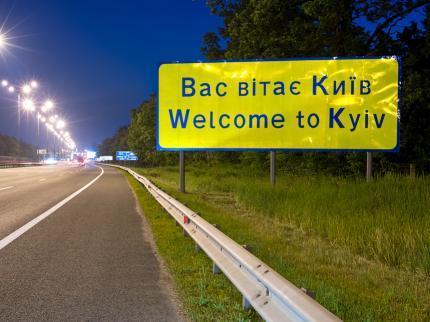
An important new book by the distinguished University of Vienna linguist Michael Moser promises to be the definitive account of the anti-Ukrainian language policies of the Yanukovych regime. Entitled Language Policy and Discourse on Languages in Ukraine under President Viktor Janukovyč, 25 February 2010–28 October 2012, Moser’s monograph is slated for publication as part of the “Soviet and Post-Soviet Politics and Society” series with Ibidem Press in Germany. Professor Moser is the author of eight books and a specialist on the Slavic languages in general and Ukrainian in particular.
The book begins with a short overview of the Ukrainian language’s historical development and treatment by both the Russian czarist and Soviet regimes. In particular, during the Soviet period:
The population of Ukraine was increasingly Russified through Russian-language education, Russian-language media, and the prevalent use of Russian in the public sphere. The use of the Ukrainian language was increasingly restricted to intellectual spheres that were under control of the totalitarian system, while the Ukrainian language standard was brought as close to Russian as possible. Apart from the Western territories that became part of the Soviet Union only in 1944, the Ukrainian standard language was rarely spoken in the streets of Ukrainian cities. Owing to widespread Soviet propaganda, those who did so were readily labeled either as country bumpkins or as “nationalists.” These tendencies lost momentum only when the Soviet Union was already about to collapse. But while the breakup of the Soviet Union did bring about a revival of the Ukrainian language, Russian never ceased to be widely used or even dominate in many spheres of life.
Given seven decades of forced Russification and de-Ukrainization, the Russian language enjoys exalted status in independent Ukraine. As Moser says, “My main argument is that the Russian language has never been under threat in Ukraine, but on the contrary tends to threaten the Ukrainian language.” Worse, the Yanukovych regime and the Party of Regions are doing everything they can to discriminate against the Ukrainian language and promote Russian.
While President Viktor Janukovyč and many others have routinely declared that Ukraine’s language legislation must go along “the European way” … concrete political actions have had a quite different touch and not led to any actual support [of] Ukrainian prior to the elections of 28 October 2012. Instead, it has only been the Russian language that has been quite efficiently promoted under the slogan of the “human right for the native language.” One vehicle of the propaganda has been the insistence on the alleged importance … of the European Charter for Regional or Minority Languages in Ukraine. This deserves attention inasmuch as Russian, though in fact legally protected by the Charter, does not meet the criteria of a regional or minority language as defined by the Charter itself. In contrast, neither the President nor the party in power have demonstrated any serious efforts for the development of any of the true regional or minority languages of Ukraine—or for the “human rights” of the speakers of those languages. Moreover, virtually nothing has been done to meet the demands of Ukrainophone citizens of Ukraine with regard to spheres where Ukrainian is obviously underrepresented, as in the media.
But that’s not all. As I’ve repeatedly argued in this blog, the Yanukovych regime doesn’t just discriminate against Ukrainian language, identity, and culture, it is positively hostile and in fact embraces a discourse and worldview that can best be termed “Russian supremacist,” with all the nasty connotations that term conveys. According to Professor Moser: “those representatives of the party in power who take an active part in Ukrainian language policy routinely refer to the Ukrainian language and identity only along patterns that have been well-known since Russian imperial and Soviet times. … they stick to an image of Ukrainian as an incomplete or ‘soiled’ language of little or no value as compared to the ‘great and powerful’ Russian language.”
Unsurprisingly, Ukraine’s domestic Ukrainophobes have found support in Vladimir Putin’s hyper-chauvinist Russia.
Particularly since 2004, official Russia and other ideologists of Russkij Mir [the Russian World Foundation] have routinely stigmatized the alleged suppression of the Russian language and the Russophone population of Ukraine, while the minority rights of the Ukrainian population, the second-largest minority in the Russian Federation, have increasingly been not only neglected, but even violated during the past two and a half years. Along with that, official Russia has returned to Russian imperialist ideologemes denying the very existence of the Ukrainian nation and language. Moreover, Russkij Mir ideologists in Russia as well as in Ukraine have increasingly depicted any initiatives for the support of the Ukrainian language as “nationalist” or “fascist” and stylized their own attempts to maintain or enlarge the Russian sphere of influence in the post-Soviet space, for which the Russian language plays a crucial role, under the slogan of a struggle against “fascism.”
There are several villains in Moser’s measured account, but two are worth mentioning. The first is the notorious anti-intellectual thug Vadim Kolesnichenko, who was the driving force behind the anti-Ukrainian language law adopted by Ukraine’s Parliament last summer. Here’s Moser on Kolesnichenko: “Kolesničenko’s discourse perfectly demonstrates the essence of the current struggle for the ‘human right for the native language’ in Ukraine. The same person who routinely refers to ‘European values’ and the necessity of the democratization of Ukraine, particularly in the sphere of language legislation, routinely makes statements that present him as a totalitarian politician of a neo-Stalinist type, who has cultivated a remarkable type of post-Soviet new-speak filled with hate rhetoric.”
The other villain is, of course, the notorious intellectual thug Dmitri Tabachnik, Ukraine’s minister of education, science, youth, and sports. According to Moser: “In the educational sphere, where the dissemination of the Ukrainian language had been most successful until 2010 (although Russophone schools or classes have always remained widespread particularly in the South and the East of the country) … Tabačnyk has made all possible efforts to cut the use of Ukrainian language and foster the use [of] Russian instead. This concerns preschool, school, and university teaching as well as the production of textbooks or the procedures of entrance exams. Tabačnyk continues to deny the very existence of the Ukrainian nation even as Minister of Ukraine.”
Professor Moser’s conclusions are not entirely gloomy:
There is no doubt that language policy as conducted under Viktor [Janukovyč’s] Presidency will have a major impact on the history of the Ukrainian language in the years to come, and that this impact will tend to be to the detriment of the state language. In the end, however, the actual impact of this policy depends on factors that are not under the direct control of politics. The decisive factor will be the reaction of all citizens of Ukraine[:] Those who speak whatever language they wish, but accept the status of Ukrainian as the state language of Ukraine and have a favorable attitude toward it, [a]nd those whose preferred language is Ukrainian and whose loyalty toward their language is of crucial importance.
There are two other reasons for some optimism. First, the Yanukovych regime is dreadfully incompetent, and policymakers who cannot tie their own shoelaces are unlikely to destroy a language. And second, the regime and its supremacist allies won’t be around for much longer. Ukrainian language, culture, and identity will.
February 1, 2013
Ukraine’s ‘New Elite’
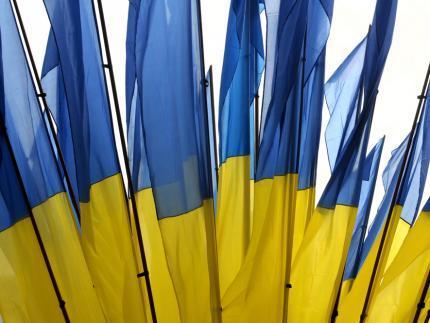
Leonid Brezhnev would have smiled when President Viktor Yanukovych made public his list of “The New Elite of the Nation” on December 29, 2012.
The 60 lucky individuals who made the list of the “presidential reserve cadres” are overwhelmingly local apparatchiks: directors, secretaries, heads, and deputy heads of the many bureaucratic agencies that misrule Ukraine. There are also two businessmen, one doctor, and one professor, although just what they’re doing there is anybody’s guess.
Each of Ukraine’s 24 provinces is represented, as are the Crimea and Kyiv City. Interestingly, 25 members of the “new elite” hail from provinces that voted for Yanukovych’s Party of Regions in the 2012 parliamentary elections, and 35 hail from provinces that voted for the opposition. The president obviously wants to signal his evenhandedness, but the more persuasive interpretation is that Yanukovych is telling the country that his Regionnaires are everywhere, even in opposition strongholds. Equally interesting is that 11 of the new elite are women and 49 are men. Nothing to crow about, you’ll say, but a bit of progress, considering the Yanukovych regime’s Neanderthal attitudes toward women.
What’s most striking about the list is, of course, that it’s a list that was compiled by the country’s rulers. Hence my reference to Brezhnev: this is exactly what the former general secretary of the Communist Party of the Soviet Union would have done in the bad ol’ days of the Evil Empire. Yanukovych, clearly, can’t quite break the hold Soviet habits still have on his thinking and, needless to say, policies.
Now, everyone knows that the best and, really, only way to produce a truly effective elite is the exact opposite of what the Ukrainian president has done. You don’t trawl among the bureaucrats for the best and the brightest a nation has to offer. Instead, you create educational opportunities that enable everybody to develop their talents and rise to the top.
So it’s “no accident,” as the comrades used to say, that Dmitri Tabachnik, Ukraine’s notoriously Ukrainophobic minister of education, science, youth and sports, should be doing everything he can to prevent the emergence of just such a contemporary, critically-minded, and competent elite. Heck, what you want in Yanukostan is bureaucratic da-men and da-women, folks who’ll do whatever the sultan tells ’em to do. The very last thing you need is smarts and initiative. Them things could rock the boat and make it capsize.
Mister Tabachnik wants to reduce university autonomy to zero and forbid students to change their majors. Both moves make great sense in a Soviet society that fears independent thinking and needs what dissident Valentyn Moroz called “cogs.” Tabachnik calls this “educational reform.” After all, he’s the product of just such a system and what the hell’s wrong with that, huh?
Fortunately, there are alternative proposals for reform on the table—let’s just say they’d make the continued replication of Tabachniks less likely—and society is pushing back, a bit. A petition to stop Tabachnik’s vision of the “new elite” is currently making the rounds. The good news is that it’s getting a lot of support. The bad news is that, of the 25 original signatories, only five were from Ukraine. The others were mostly academics from North America and Western Europe. (Disclosure: I’m one of the signatories.)
Here’s the gist of the petition:
The Parliamentary Commission on Education in Ukraine will consider several proposals on educational reform … If the proposals of the newly reappointed minister of education and his supporters take shape, then bureaucracy would dictate what to teach, how to teach, what disciplines students should take, and what professional careers individual students should build.
If the conservative approach prevails, intellectual sovereignty would become null and void. Universities would be integrated into the politically biased and inefficient state bureaucratic system …
Mobility is exactly what makes today’s world media so rich, productive, and inspiring. In our time, the best journalists are often university-trained historians; the best writers may be former scholars of physics; and poets can be former medical doctors and engineers.
To impose a strict yoke on the university system, disallowing universities to run themselves and shape their own priorities and mobility system is to strangle the idea of higher education and to plunge Ukraine into backwardness …
This is precisely what is at stake—the independence of Ukraine on an intellectual level. This is exactly what the opponents of pro-European reform are trying to suppress. Intellectual independence and mobility is what scares them most …
It should be crystal-clear that it is up to the individual to decide which school to attend, what area of study to follow, and how to apply one’s intellectual capacities. It is up to a university to decide how to structure undergraduate and graduate education. Even the best-educated authority cannot be a specialist in all the branches of knowledge. Therefore, it is the university as a sovereign intellectual institution that should make decisions about its development.
This is what reform is all about—and this is what we support. The independence of Ukraine begins with an independent mind and with intellectual mobility. Only the sovereignty of universities can make true Ukrainian independence happen because it is the independence of the mind that can set the individual free.
Go ahead and sign the petition. Stop the Cog-in-Chief and his Minister of Cogs from creating more cogs.
January 27, 2013
Run, Regionnaire, Run
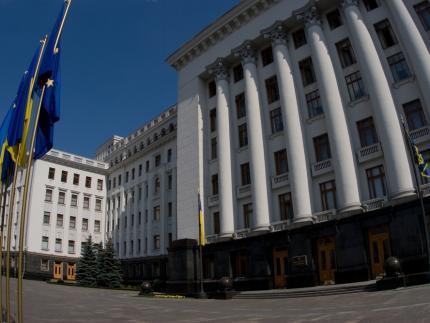
When arrogant thugs start talking the language of compromise and reason, you know they’re getting desperate. Look at the Soviet Communists. When they felt on top of the world, they insisted they’d “bury” the West. When they knew the jig was up, they discovered the pleasures of détente. Some fifteen years ago, when I visited Cuba as part of a cultural-educational group, our guide Ernesto insisted that the embarrassingly visible prostitution and black-marketeering we encountered on all of Havana’s streets were part of human nature. When he said, “We’re just like you,” I knew that Cuban communism was kaput. Most recently, North Korea’s dictator Kim Jong-un stated: “An important issue in putting an end to the division of the country and achieving its reunification is to remove confrontation between the north and the south.” There goes another socialist paradise.
Some of Ukraine’s Regionnaires have also begun speaking like human beings—a sign that they, too, are desperate. First, there’s the notorious Ukrainophobe from Donetsk, Nikolai Levchenko, a local politico who gained notoriety a few years ago by ridiculing Ukrainian language and culture and claiming to have read Leo Tolstoy’s War and Peace seven times. He was subsequently immortalized as a corrupt Stalinist popinjay in Jakob Preuss’s brilliant documentary film, The Other Chelsea. After being elected to the parliament in one of Donetsk’s majoritarian districts on October 28th, Levchenko recently gave a remarkable interview to the UNIAN news agency, in which he repeatedly apologized for his insensitivity and stupidity:
I remain a Russian-speaking citizen of Ukraine. I love Russian culture—Esenin and Pushkin—more than Lesya Ukrainka and Taras Shevchenko. But not because they are worse. I just happen to love them … I want to express my apologies for what I once said. I apologize to those I insulted. I never thought about it. It’s only now that I’ve considered: how would I have reacted if someone had said the same about the Russian language? I would have been insulted. Perhaps I’ve matured. But I understand how I could have insulted people who love all things Ukrainian just as I love the Russian language. I respect the Ukrainian language and definitely love it more than someone living in Vorkuta or Semipalatinsk. I sincerely request forgiveness, and not just with words, but with my heart, from those people I insulted … My apologies are not political. They are exclusively human.
Yeah, right. After years of gross insensitivity, the timing of Levchenko’s sudden conversion to decency—right on the heels of getting a job as a deputy in Kyiv—just isn’t persuasive. Far more likely, his Regionnaire bosses ordered the young whippersnapper to cool it. The party couldn’t even manage to cheat its way to a majority, Viktor Yanukovych is despised, the country is going down the toilet—and Russian supremacism may not go over quite as well in the anti-Regionnaire capital as in the Donbas.
And then there’s the notoriously Ukrainophobic blogger and analyst Oles Buzyna, who likes to engage in fisticuffs on television talk shows. Here’s what he had to say on the eve of the New Year:
The authorities and the opposition are quite worthy of each other. I hope that our citizens will finally begin to appreciate half-tones and stop idealizing and demonizing the two sides. Both the Party of Regions and Svoboda are not as terrible as they’re being depicted. And the other parties are not as clean as one would want. Consider Natalya Korolevska’s ability to adapt. Just recently she stood side by side with Yulia Tymoshenko, and now she’s a minister in the government of the anti-Tymoshenko Azarov. Good for her! She knows that there is no substantive ideological difference between them. And we too shouldn’t be dividing things. You like Mazepa? I prefer Bohdan Khmelnytsky. But that’s no reason for people living in Ukraine to hate one another. There’s enough room here for everyone—both on the Earth and among monuments.
What’s this? A tough-guy Regionnaire suggesting his party isn’t all that different from the right-wing Svobodites? A hard-line, fist-swinging, extremist ideologue arguing for reconciliation and love? Yikes! The Regionnaires must believe they’re in even more serious trouble than even their harshest critics suggest.
Notwithstanding my skepticism, Ukraine’s democrats should take the likes of Levchenko and Buzyna at their word. After all, what have they to lose? And besides, it’s not every day that the Regionnaires rise to the moral level of Kim Jong-un.
January 17, 2013
The Yanukovych Ruin and Its Aftermath, Part 2
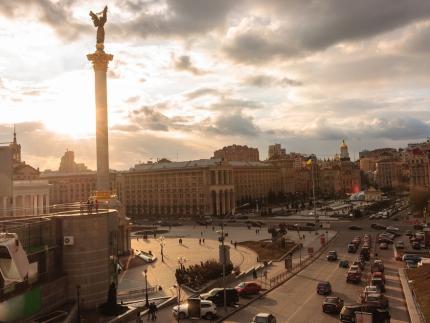
While the Yanukovych regime’s likely disintegration (discussed last week in Part 1) is not tantamount to an institutional void, the destruction wrought by sultanism will place post-Yanukovych Ukraine in the extraordinary position of being a country without effective political institutions. Indeed, Ukraine will approximate a failed state. Under conditions such as these, the most important political actors will be the oligarchs, forces of coercion, civil society and opposition movements, and charismatic individuals.
The oligarchs, the military, the militia, and the security service will survive collapse intact, even if the regime’s downfall is accompanied by social upheaval and mass violence:
Ukraine’s tycoons will remain fabulously wealthy and influential, regardless of whether they hide on their estates or in their villas in the West. Their primary interests will, as always, be the protection of their assets and privilege, which means stability and security. Although sultanism offered some measure of both, the collapse of sultanism and Ukraine’s subsequent time of troubles will likely incline the oligarchs to seek to align Ukraine with the global economy in general and the West in particular as the only reliable guarantors of both.
The forces of coercion will remain relatively strong, although, in all likelihood, despised by, and illegitimate in the eyes of, most of the population.
A variety of civic and political groups, movements, and organizations will survive, and perhaps even thrive, in a stagnant sultanistic regime, and all of them will make claims on the right to guide Ukraine in the aftermath of Yanukovych’s fall. Their claims will be persuasive, legitimate, and popular, but they will be effective only if civil society resists the temptation to squabble and self-destruct.
In transitional circumstances such as these, charismatic leaders will thrive. Articulate individuals with forceful agendas and moral authority will be best positioned to play such roles, and it is they who could provide civic and political organizations with a unifying agenda and a common purpose. It is also they who could conduct negotiations with strong, but weakened forces of coercion and win them over to the side of the people. If she survives until then, whether in jail or in exile, Yulia Tymoshenko could easily emerge as Ukraine’s Nelson Mandela.
With institutional destruction, regime collapse, and Regionnaire flight on the one hand, and oligarch influence, coercive uncertainty, social mobilization, and charismatic leaders on the other, Ukraine could be in the position to do away with more than 24 years of regime ineffectiveness and achieve an institutional breakthrough along the lines of East Central Europe in 1989–1991. Then, too, the existing Communist regimes had eviscerated political institutions, promoted state decay, and tolerated powerful civic institutions such as Solidarity, dissident movements such as Charter 77, and charismatic individuals such as Lech Walesa and Vaclav Havel.
When the Communist regimes collapsed and the forces of coercion remained indecisive and were unwilling to crack down, civic/political organizations were able to join forces with charismatic individuals to promote breakthroughs that enabled their countries to abandon communism and embark on democratic and free-market reform. The forces of the ancien régime were too weak, too confused, or too preoccupied with saving their own skins to stop them, and success was assured.
The choice before Ukraine’s future democratic elites will mirror that before Poland and Czechoslovakia more than twenty years ago. Post-Yanukovych Ukraine will remain unified, like Poland, if its civic-political institutions, oligarchs, and leaders can agree on some degree of federalization or decentralization that enables Ukrainian-language speakers and Russian-language speakers to use Ukrainian as a lingua franca and to enjoy linguistic choice at other levels of social interaction. Post-Yanukovych Ukraine will go the way of Czechoslovakia if some such consensus is not found.
Chances are that the Polish scenario will get the upper hand. The Yanukovych regime’s endorsement of Russian supremacism may appeal to diehard Russian-language speakers, but it will, several years from now, likely be as discredited as the regime that spawned it. Unless the post-Yanukovych democrats engage in linguistic maximalism, it’s a good bet that Ukraine will survive intact and that a “social contract” between East and West will emerge, especially if the oligarchs endorse it, as they are likely to do. That said, we should remember that, if Ukraine follows in Czechoslovakia’s footsteps, both the Czech Republic and Slovakia prospered in the aftermath. A central-western Ukrainian Ukraine will move unhindered toward the West and do well economically. A southeastern Russian Ukraine will probably join the Russian Federation and, while certain to stagnate economically, will be able to enjoy the Russian language and Soviet traditions.
A more substantive danger to post-Yanukovych Ukraine will be Vladimir Putin’s Russia. The chances that a declining quasi-fascist petro-state such as Russia will become strong and stable are few. A beleaguered Putin will almost certainly not choose democracy as the means to save himself and his regime. Instead, Putin will tighten the reins and increase his neo-imperialist rhetoric, perhaps hoping for a “quick little war” that could provide his tottering regime with a shot in the arm.
Will Ukraine survive a possible military intervention? It could go the route of Yugoslavia, and the resulting instability could also spell Russia’s doom. Or post-Yanukovych democrats and oligarchs may succeed in drawing on burgeoning popular patriotism and organizing a mass mobilization in defense of the “homeland.” Given the parlous nature of the Putin state, the outcome could easily be a stalemate, which would be tantamount to a victory for Ukraine. Naturally, a defeat would mean Ukraine’s loss of the Crimea and some southeastern territories to Russia. That would be painful, but it could also consolidate a post-Yanukovych consensus around a breakthrough agenda in independent Ukraine.
Future historians are likely to credit the Yanukovych Ruin with having cleaned Ukraine’s slate institutionally and thereby prepared the way for a consolidated democracy and a free-market economy. It took Poland a little more than three decades to become independent after the uprising of 1956. With the acceleration of time in the present age, Ukraine’s 1989 may even come in 2015. And then, with a little luck, the country may finally be in the position to join the world.
January 9, 2013
The Yanukovych Ruin and Its Aftermath, Part 1
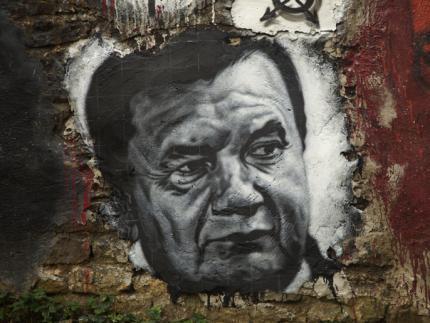
Although Ukraine may have to endure another three to eight years of Viktor Yanukovych’s misrule—until the presidential elections of 2015 or 2020—the end, fortunately, is in sight, and the challenges of post-Yanukovych reconstruction may be envisioned, at least in broad outlines. Following the extensive institutional destruction wrought by Yanukovych and the Party of Regions, Ukraine will have to be reconstructed from top to bottom. Mere reform will no longer be enough. Even “radical reform” may not quite accurately capture the magnitude of change that Ukraine will have to endure to emerge from the “Yanukovych Ruin” politically energized and rejuvenated, rather than enervated and ossified.
Whether or not Yanukovych remains in office through 2015 or 2020 almost does not matter. The institutional destruction he initiated in 2010 is more or less complete, a brittle sultanistic regime has emerged, and neither three nor eight years of additional misrule will significantly deepen or extend the political damage. Naturally, Ukraine’s economy and society will experience far more destruction from eight years of ruin than from three. By the same token, the likelihood of an oligarch-led putsch or a popular rebellion involving violence will grow the longer Yanukovych and his Regionnaires remain in power. But the political regime he created—sultanism—will not change qualitatively anymore, except to break down.
After his election as president in early 2010, Yanukovych quickly accumulated vast powers, thereby transforming the presidency into a near-dictatorial office, while subordinating the other two branches of government—the Parliament and the courts—to himself and his party. Despite claiming to be a moderate, Yanukovych proved to be a quintessential revolutionary committed to destroying the existing political order as rapidly and as thoroughly as possible. Yanukovych’s power base, the Party of Regions, quickly became the functional equivalent of the Communist Party of the Soviet Union under Leonid Brezhnev: a vehicle for acquiring power, accumulating wealth, and dispensing patronage. Whatever ideological visions the Regionnaires claimed to have were abandoned, and they became little more than the greedy clerks who once mismanaged the Soviet empire.
Given the evisceration of the non-presidential branches of government and the emergence of the Regionnaires as the party of both power and theft, it was inevitable that Yanukovych would become the focus of increasingly personalized rule, while his closest confidantes would join him in plundering the country. The logical end point of this institutional development was reached in 2012: the triumph of Yanukovych and his “Family,” the reduction of the Rada and the courts to meaninglessness and buffoonery, and the transformation of the Party of Regions into nothing more than an instrument of rapine.
Having attained the “highest stage” of sultanism, such a regime can experience little institutional development in the next three to eight years. Yanukovych and his family cannot acquire more power, the other institutions of government cannot become more meaningless, and the Regionnaires cannot become more rapacious. Because sultanistic regimes are invariably corrupt and conservative, there is no reason to think that the avaricious mediocrities who man the Yanukovych system will be able or willing to sacrifice their well-being to vague notions of reform, especially if reform undermines their power and privilege.
On the other hand, such a deeply dysfunctional regime is a leading candidate for stagnation and decay. And, sooner or later, the sultanistic Yanukovych system will collapse under its own dead weight. Most probably, that collapse will come in 2015, during the next presidential elections, or in 2020, after Yanukovych finishes his second term. The only question facing Ukraine is whether or not collapse will occur peacefully.
It is perfectly possible for the tycoons whose assets are being stripped by the Yanukovych Family to join the forces of coercion and, in the manner of many third-world countries, stage a coup. It is also possible for mass-based violence to occur. It generally does when societies are humiliated and exploited, when oppressors look vulnerable and weak, and when individuals or groups with violent agendas exist. The first two conditions are already present in Ukraine and both will only intensify as the economy continues to stagnate and Regionnaire abuse of the population continues. The third could easily emerge, especially if a brittle sultanistic regime resorts to violence itself. Weak regimes often employ violence in the hope of quashing internal opposition. More likely than not, their violence only induces radically inclined individuals and groups within society to respond with violence.
The collapse of sultanism will mean the collapse of a meaningless Parliament, meaningless courts, and an all-powerful presidency. The Party of Regions will also collapse. Were the Regionnaires an ideological party, some of them might stay and fight. But inasmuch as their primary concern is self-enrichment, they will head for the hills as soon as the writing appears on the wall.
The task facing Ukrainians after the Yanukovych Ruin will be enormous. Inasmuch as Yanukovych and the Regionnaires have effectively destroyed post-Soviet Ukraine’s political institutions, Ukrainians will have to construct a political regime de novo.
Photo Credit: Abode of Chaos
January 2, 2013
Is 2013 the End for Ukraine's Regionnaires?
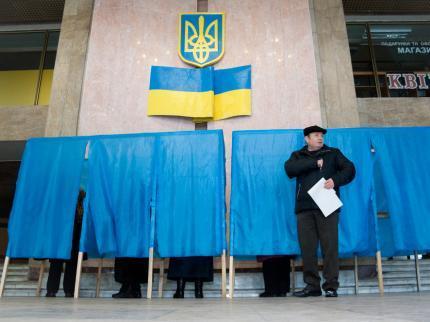
Last year ended with a series of portentous developments for the Yanukovych regime. And, more and more, it looks like the regime’s ready to break down or crack up. Consider the signs.
The almighty Regionnaires couldn’t even cheat their way to a majority in the new Parliament and, instead, had to settle for what effectively amounts to a power-sharing arrangement with the opposition. Worse, they will now have to deal with a raucous collection of right-wing deputies, the “Svobodites,” who will harass and jeer them at every step of the way.
The much-vaunted professionalism of the Regionnaires received two fatal blows, when, first, the government was snookered into signing a billion-dollar deal with an imposter claiming to represent a Spanish energy firm and, second, all the expensive Hyundai trains procured by former Infrastructure Minister Boris Kolesnikov just before the Euro 2012 soccer championships last summer broke down in the harsh Ukrainian winter.
In moves that could impress only Leonid Brezhnev in the final years of his inglorious reign as Communist Party leader, the newly appointed speaker of the Parliament became Viktor Yanukovych’s crony from Donetsk, the aging, dull, and thoroughly uninspiring Volodymyr Rybak, while the prime minister’s job went to the equally dull and uninspiring incumbent, Mykola Azarov.
The notoriously Ukrainophobic Dmitri Tabachnik remained minister of education, science, youth, and sport, thereby demonstrating the president’s mindboggling inability to understand that replacing him with anyone would have won him easy brownie points with the electorate.
That two of the brightest, if morally compromised, members of the old Cabinet, Serhii Tyhypko and Valery Khoroshkovsky, have left—the former for Parliament, the latter for his business empire—demonstrates, first, that Yanukovych’s primary criterion in choosing ministers was not talent or brains, but loyalty and, second, that the pro-regime elites are jumping ship.
Since the new Cabinet consists mostly of Yanukovych loyalists who are beholden to his “Family,” the clan run by the president and his two sons, the newly appointed ministers will focus their energies on fulfilling the sultan’s wishes, thereby aggravating the regime’s hypercentralization, indecisiveness, incompetence, ineffectiveness, and instability.
Because Yanukovych yes-men also control all the most important financial and economic ministries, the Ukrainian economy will continue to decay, while the Family’s plundering of the economy will accelerate, perhaps in anticipation of the rapidly approaching end and, hence, the limited amount of time left for untrammeled theft.
All the other seats on the Cabinet went to Donetsk hyper-billionaire Rinat Akhmetov’s flunkies, a sign that Yanukovych has formalized his alliance with Ukraine’s richest man, accepted that his power base has been reduced to a sliver of the country, the Donbas, and effectively acknowledged that he has no legitimacy among the people or even—no less important—the other oligarchs and elites.
The last-minute cancelation of the Ukrainian president’s planned trip to Moscow, the European Union’s continued dissatisfaction with his regime, Secretary of State Hilary Clinton’s harsh criticism of Ukraine’s democratic backsliding, and China’s deafening indifference demonstrate that Yanukovych has managed to achieve the near-impossible in international relations: complete isolation.
I could go on, and on, but this brief list should suffice to show that the regime may very well be on its last legs. As shockingly incapable as it was of getting anything right between 2010 and 2013, its incompetence, thievery, and resistance to common sense will probably only grow in the months ahead. As more and more power is concentrated in the Family and its pater familias, the regime will eventually be reduced to an inglorious royal court whose only concerns are self-enrichment and self-preservation. Since Yanukovych loyalists also control the power ministries, the temptation to crack down in order to avert a crack-up will be overwhelming. Cracking down won’t work, however, because the vast majority of the population no longer fears the dullards running the country into the ground.
The new year therefore begins on a hopeful note for Ukraine and its democratic aspirations. The writing is on the wall for the regime. If they’d only read more and steal less, they might even see it.
December 26, 2012
Ukraine’s President Commiserates with Santa
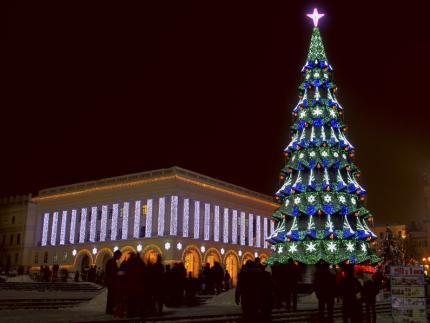
Dear Santa, Sorry for writing so late, but I’ve been as busy as a canary in a coal mine and haven’t had the time to get my personal life in order. And I gotta tell ya, Big Guy, this job stinks as bad as methane. Why didn’t anybody tell me back in 2004 or in 2010, huh? I mean, like, the wife couldda said, “No way, Jose, stick to your coal mines and don’t mess with no country that’s the size of France.” Heck, Santa, I don’t even know where France is! I figure it’s the size of Ukraine, which is pretty big, but is it as big as the Donbas? See what I gotta do in this freakin’ job? They got me learning geography and stuff and all I wanna do is ride my copter and shoot bison. Is that too much to ask, Santa? Is it? Course it ain’t! I figured this country would be, well, you know, sorta like a Lego set. You put the pieces together and then you take ’em apart and the wife and the boys would say, “Swell job, pops, where’d you learn engineering?” But no! The people here wanna play with my Legos! And now the Rada is full of guys tellin’ my boys how to run the show. Democracy used to be so easy. That bald fella in the Rada used to tell ’em to raise their hands and they raised their hands. He told ’em to vote and they voted. It was neat, Santa, like a glass of vodka. And now the joint’s crawlin’ with democreeps and this big boxer fella who thinks that, just because he can land a punch or two, he can be president of a country the size of France. Santa, where the hell is that place anyway? And is it really the size of Ukraine?
Exhausted,
Viktor
Dear Viktor, I’m glad you finally wrote. To tell the truth, I was getting worried that my boy, Viktor, was hit with an egg again and landed in the hospital. Or, maybe he get lost hunting jackrabbits on his estate? Did Ludmila hide his socks? My worries may have been exaggerated, but I know you live in a tough neighborhood. By the way, Viktor, there’s something you should know. One of my elves has been talking with some of your party friends and oligarchs, trying to encourage them to change their ways, support good causes, and the like. Well, my elf tells me they told him they’ve just about had it with you. One of them reportedly fumed: “If he builds one more palace, that’s it.” So, my boy, watch your back, appoint Azarov as your official food taster, and avoid dark alleys. By the way, what do you want for Christmas?
Best,
Santa
Dear Santa, Those schemin’, good-fer-nuttin’ disloyal rats! I’ll get ’em, Santa! Really, where would they be without me? Nowhere! Where would their wealth be without me? Still in the citizens’ pockets from which we stole it. That’s where! I’m just too good for this world, Santa. I’ve got a heart like a donut and the temperament of a lamb. I guess that’s why I figured I had to take charge of this joint. Wouldn’t it be something if all Ukrainians were like my boys, Junior and Sasha? Junior’s got my political genes, Santa. The boy’ll go far, maybe even become top dog. President Junior Yanukovych: sounds swell, huh? And Sasha’s gotta be the world’s best dentist. Dunno how the boy does it, but his practice is getting real fancy-like. It’s lookin’ more and more like a bank and he’s got the swellest folks comin’ in to get their teeth fixed. And he only charges 15 percent of what the other dentists do. See, Santa? That’s what we Yanukovyches are: tough, strong, honest, and entrepreneurial. And I’ll tell ya somethin’ else, Big Guy: I think me and the boys could take that Klitschko fella. Sure, he’s got big fists, but we’ve got brains. Oh, I just remembered: you asked what I wanted for Christmas. A trip to Disneyland Paris: that’s what I want. Azarov tells me the place is crawlin’ with really neat palaces and that it’s in France. Wait: isn’t that the place that’s the size of the Donbas?
Yours expectantly,
Viktor
Dear Viktor, Is that all? No problemo: you got it! By the way, when you’re in Paris, do visit the Ukrainian church on Saint Germain. One of the icons is really beautiful.
Yours,
Santa
Dear Santa, Was that jab really necessary, big guy? I know I’m beautiful, but please don’t call me a con again, OK? It hurts.
Yours till next year,
Viktor
December 19, 2012
Power Politics in Ukraine's Parliament
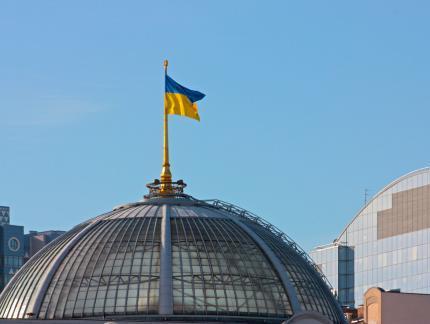
The correlation of forces in the Ukrainian Parliament, the Rada, may have shifted. Not in terms of votes, of course, as the Regionnaires and their allies still have a majority of deputies.
But in terms of what really matters in the surreal world of Viktor Yanukovych’s Ukraine: fists.
With the election to the Rada of 38 deputies from the right-wing nationalist Svoboda party and of ex-boxer Vitaly Klitschko, head of the Ukrainian Democratic Alliance for Reform, the Regionnaires have been transformed from a gang of thugs willing and able to spring a pogrom on the opposition to a bunch of mostly overweight and balding bullies who know they’ve more than met their match.
The fisticuffs that broke out during the first two days of the newly elected Rada’s sessions demonstrated the shift in power. The Svobodites are big and strong and young and, unlike the diminutive democrats who would consistently get their butts kicked in the past, took no guff from the Regionnaires. And listen to the very big Klitschko’s veiled threat: “I understand many people’s desire that I join the attack, but I wish to remind them that, for instance, in the United States, a boxer’s fists are compared to a weapon, and a world champion’s fists to a nuclear weapon. And we will not use that weapon. Not yet.” You can be sure that the Regionnaires’ scrappy tough-guy-in-chief, Vladyslav Lukyanov, was listening attentively.
The brawls that erupted did nothing to enhance the Rada’s stature at home or abroad and they’re obviously no way to run a democracy, but, in putting the Regionnaires on the defensive, they could have enormous implications for the Ukrainian political system.
For the first time in many years, the Regionnaires know that their shenanigans—their steamrolling of the democratic process, their indifference to procedure, their violations of ethical norms, their adoption of outrageously self-serving policies, and their wanton use of violence against the opposition—will provoke brawls they will lose. Remember: most Regionnaires are immune to reason and want only two things, more power and more wealth. Some Ukrainians compare them to Nazis. And how, these Ukrainians argue, do you stop Nazis? Not with appeasement and not with appeals for compromise. Or, as one liberally minded Ukrainian businessman who detests Svoboda said about the Regionnaires: “If you live by the sword, you die by the sword.”
Now that the Regionnaires understand they can’t run the Parliament like their gang turf, how are they likely to respond?
Although the Regionnaires know that the Riviera sun is only half the fun with broken noses and black eyes, their power itch will be irresistible. Their first impulse will be to buy the opposition’s tough guys, but that’s unlikely to work. The Svobodites will beat up potential turncoats, while Klitschko is a self-made millionaire and doesn’t need Regionnaire bribes.
Their second impulse will be to offset their physical disadvantage by arming themselves with chairs, microphones, lecterns, and the like. That, too, won’t work, because the opposition will respond in kind.
At some point down the road, when the Regionnaires finally understand they can’t win the arms race, a third impulse—call it the return to some rationality—may kick in. Since the Regionnaire desire for self-preservation should trump even their desire for lucre, there’s a chance they’ll eventually tire of bloody noses and tone down their excesses. The Rada could then become, for the first time in some seven or eight years, a semi-functioning institution. The new Rada speaker, Yanukovych crony Volodymyr Rybak, may have hinted at things to come when, on December 17th, he called on deputies to “listen to one another” and to “rise above party interests, acknowledge the importance of popular interests, and work on behalf of the people.” When representatives of the mafia call for reason, you know they’re in serious trouble.
Now consider how President Yanukovych will respond to the fisticuffs. If the Rada becomes a barroom, he’ll have to take full responsibility for all of policy, be held accountable for the country’s descent into the third world, endure the indignity of having his regime compared unfavorably with the chaos of Viktor Yushchenko’s last two years in power, and suffer the consequences in the presidential elections of 2015 or before. Kyiv’s corridors of power are already abuzz with rumors of impending coups and the din will only increase as Yanukovych’s nakedness becomes increasingly embarrassing.
Dissolving the Rada and calling for new elections won’t work, as the democrats and Svoboda will only increase their share of deputy seats. And besides, given the Parliament’s current truculent mood, it’s a good bet that many deputies won’t heed the president’s call to go home and, instead, will declare the Rada sovereign, thereby directly challenging the authority of the hapless president.
And if the Rada actually becomes a semi-responsible institution and begins to play the role of a genuine legislature, Yanukovych may finally see his vast powers constrained and, far worse, his vast wealth subjected to public scrutiny. Whatever the scenario, the poor prez and his two sons will be in a major-league pickle.
Armies like to intervene in such circumstances, but Ukraine’s is a joke. The only two forces that could save the country from ungovernability will be the democratic opposition and the oligarchs. The former has the popular support and the legitimacy, while the latter have the money and the clout. Most of the democrats receive funding from the oligarchs anyway. The oligarchs must know that only democracy and rule of law can safeguard their wealth in the long run. An alliance, perhaps? With Yulia Tymoshenko, the democratic oligarch, as the next president? Why not? Besides, she’s the only Ukrainian politician who could outpunch Klitschko.
December 12, 2012
Ukraine Government Duped by Conman
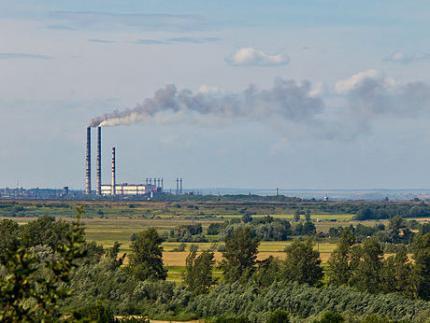
By now, everyone in the world knows about the Yanukovych regime’s embarrassing non-deal with Spain’s Gas Natural Fenosa utility company. On November 26th, Vladyslav Kaskiv, the director of the Ukrainian state investment agency, and a man he believed to be Fenosa’s plenipotentiary, one Jordi Sarda Bonvehi, signed a document committing Fenosa to participate in a $1 billion project to build a liquefied natural gas plant near Odessa. The signing took place amid much fanfare and in the presence of a beaming Prime Minister Mykola Azarov and Energy Minister Yuri Boyko.
Almost immediately after the TV cameras stopped rolling, Fenosa denied that Sarda Bonvehi was empowered to sign anything on its behalf. In a word, the Yanukovych regime’s top policy makers had agreed to a deal with an imposter. The Ukrainian press had a field day. Even the New York Times and other international news outlets got in on the act.
Much of the reporting has focused on the imposter, but he’s not the story. The real story is how the Yanukovych regime could not have known that it was conducting negotiations with a conman. “We never doubted he was authentic,” is how the hapless Kaskiv put it to the Times. He could just as well have said: “We were suckers.”
There are four possible explanations for the scandal.
First, the Yanukovych regime in general and the Regionnaires in particular are not known for their high IQs. If you’re dumb—an adjective that I’ve used with wild abandon in describing these guys—that dumbness will resonate throughout everything you do. From this point of view, the non-deal with Fenosa shouldn’t surprise us: it’s the norm, and not the deviation from the norm. Why engage in something as obvious as due diligence and check this guy’s background or, at the least, ask to see his business card or, heaven forbid, even place a phone call to Fenosa? Heck, if he has a Spanish accent, he must be for real, right?
Second, it’s possible that some agency actually checked Sarda Bonhevi’s background and knew that he’s an imposter, but either forgot to tell Kaskiv or sent a memo that got lost in the shuffle. In other words, the culprit would be Regionnaire incompetence and bureaucratic fragmentation. Despite Regionnaire claims of being professionals, the fact is that these fellas are deeply provincial politicians who are masters at theft and boobs at policy. They couldn’t make the trains run on time even if the trains ran on time. By the same token, the over-centralization of the vast power in President Yanukovych’s less-than-professional hands has, not unexpectedly, compartmentalized and fragmented the government bureaucracy and made it difficult for its various agencies, which are focused on following orders from the sultan, to communicate and cooperate laterally. Yanukovych thinks that, if he runs everything, everyone will do what he tells them to do. In reality, they will do nothing except wait to be told to do something.
Third, it’s perfectly possible that other agencies knew exactly who Sarda Bonvehi was, but decided not to tell Kaskiv, Azarov, and Boyko. Authoritarian regimes are always rent by savage intra-elite competitions for the boss man’s favors and the culprit could be some minister, oligarch, or clan out to get the prime minister. If so, such cutthroat infighting could mean that the Regionnaire elite is cracking up.
Fourth, the fact that the scandal is also a major embarrassment for the entire Yanukovych regime and undermines its efforts to search for alternatives to Russian gas suggests that Russia’s Gazprom or security service might have been involved. After all, what right-minded foreign investor would be willing to talk to the clowns running the Ukrainian energy sector after a scandal of such incomprehensible magnitude?
The Yanukovych regime’s main oversight was, of course, never to have called me. I’ve got tons of friends and all of them are empowered to sign major deals. There’s this guy I know in Bensonhurst who’d be willing to sell Kaskiv the Verrazano Bridge for a song. My pal Hans in Vienna could get ’em a great deal for the Ringstrasse. And Big Lou has been looking for a buyer for the Paris Metro for years.
Business is easy. You just gotta know the right people.
Photo Credit: Raimond Spekking
December 5, 2012
Hard Times Ahead for Ukraine
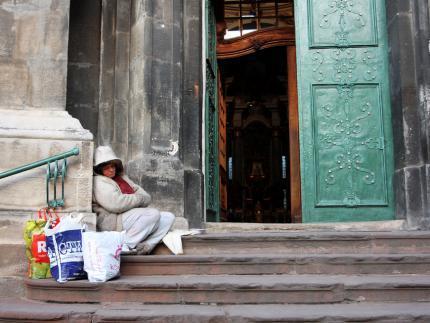
This year has been exceptionally difficult for Ukraine’s economy, and 2013 is unlikely to be any better. Popular discontent with the inability of the Yanukovych regime to provide the population with decent living standards contributed greatly to the Regionnaires’ poor showing in the October parliamentary elections in which, despite significant fraud, they managed to scrounge up only 30 percent of the popular vote. As the economy goes into tailspin, popular opposition to the president and his rapacious party of power will grow and Viktor Yanukovych will face an unenviably stark if richly deserved choice: either to ignore reform and attempt to shore up his crumbling rule with force or to promote economic reform by loosening his hold on political power.
According to the SigmaBleyzer Private Equity Investment Firm and The Bleyzer Foundation in Kyiv, here’s the bad news (pdf):
Ukraine’s industrial output fell by 4.7% yoy [year on year] in August and 7% yoy in September. Slipping global demand for steel and iron ore weighed on the steel and mining industries. In addition, production of machinery equipment and transport vehicles suffered from increased trade tensions with Russia, the largest consumer of Ukraine’s machinery products. In particular, output production in the machine-building industry fell by almost 17% yoy on average over August-September…. Domestic demand has also been cooling. A steep decline in the construction sector (by about 9% yoy over January-September 2012) signaled the subdued investment activity. Due to strained public finances, an ongoing credit squeeze and restricted access to foreign financing, the current level of investment spending cannot fill the gap left after the completion of large infrastructure projects related to the Euro 2012 football championship. Moreover, a deceleration in retail sales growth to 16% yoy over January-September indicates that private consumption has started to ease. While a deceleration in real wage growth to 11.7% yoy in September contributed to softening demand, consumer spending was likely affected by growing political and economic uncertainties. Due to weaker external and internal growth factors, the Ukrainian economy is forecast to increase by about 1% yoy in 2012.
The half-bad, half-good news is:
Ukraine’s inflation remains at a decade low level. ... Despite eased inflationary pressures, monetary policy remains tight. The National Bank of Ukraine continues to use a mix of its policy measures (banking sector liquidity regulation, forex interventions, and administrative restrictions) to suppress Hryvnia foreign exchange fluctuations. A relative stability of the exchange rate, however, was achieved at the cost of subdued bank lending activity. Indeed, the stock of bank loans rose by only 1.2% from January to September this year. A good agricultural harvest, large grain stockpiles ahead of a new marketing year and elevated world grain prices supported Ukraine’s exports of agricultural products, which expanded by about 50% yoy on average over August-September this year. This improvement, however, could not compensate for weaker exports of other key commodity groups (metallurgy, machinery, minerals). As a result, exports slowed to 1.1% yoy in August and fell be about 3% yoy in September. While imports also eased, Ukraine’s current account stood high at about $1.4 billion in August and September. The nine month gap amounted to $9.2 billion and is forecast to reach 6.5% of GDP this year. Growing external imbalances, high external debt financing needs amid turbulent international financial markets and strong population demand for foreign currency generate depreciation pressures.
One of the immediate upshots of all this is that, as Bloomberg puts it:
Ukraine’s government is running out of options to finance $4.3 billion of outstanding foreign-currency debt in the first half of next year. The government, which raised $1.25 billion in a bond sale on Nov. 20, wants to extend a $15.4 billion IMF loan suspended in March 2011 that expires this year. To regain access to funds, the government needs to give up resistance to raising gas prices and adopting a more flexible exchange rate. The economy, among the world’s worst-hit during the 2009 global recession, is slumping as the euro area’s crisis curbs demand for such export products as steel. President Viktor Yanukovych, who drew European Union criticism over the jailing of former Prime Minister Yulia Tymoshenko, has struggled to obtain alternative financing.... Ukraine’s default risk is the sixth-highest among 93 countries tracked by Bloomberg. The benchmark Ukrainian Equities Index has lost 41 percent this year, the world’s second-worst performance after the Cyprus General Market Index. International reserves have plunged to $26.8 billion, the lowest since May 2010, as the central bank dipped into the stockpile to prop up the hryvnia [Ukraine’s currency].
Clearly, Ukraine’s government will face some tough economic choices in 2013, at precisely the time that the legitimacy and stability of the Yanukovych regime will be at all-time lows. Popular regimes have difficulty enough persuading their constituents that belt-tightening is necessary. Unpopular, corrupt, and morally bankrupt regimes are intrinsically incapable of making any such appeals. Who would listen to a president who collects villas and whose family has practiced fabulous self-enrichment while the population has experienced impoverishment? Who would listen to a Parliament that has assiduously done nothing to promote the common weal and everything to divide the country against itself? Indeed, how many of Ukraine’s oligarchs will continue to support Yanukovych in the face of economic decline and political haplessness?
Unfortunately for the Yanukovych regime, inaction is no option. The economic situation is getting critical and the regime’s own survival may be on the line. What to do?
There are three options:
First, even though inaction is no option, Yanukovych may be sorely tempted to continue with the status quo. That would mean withdrawing into his palace, closing ranks with the most obtuse Regionnaires, and employing coercion with greater abandon. Past dictators have acted in this manner and managed to stay put for a while. Coercion will only provoke a counter-reaction from vested interests and radicals and the strategy of withdrawal is doomed in the long run, but Yanukovych may just decide that a few more years in power would give his sons enough time to transfer their funds abroad and prepare the transition to some warmer clime.
Second, Yanukovych could adopt bona fide reform that permits entrepreneurship to flourish and small and medium-sized business to generate the employment and economic growth Ukraine needs. This makes sense, of course, but would also mean introducing painful free-market measures and restructuring the political economy in favor of the little guy and not the tycoons. Neither measure is thinkable without expanding the regime’s political base and creating something in the nature of a grand coalition with the democratic opposition. The Regionnaires will howl in protest. The unenlightened oligarchs will, too. Will Yanukovych have the savvy and the will to use coercion against his own allies? Don’t bet on it.
Third, Yanukovych could seek outside support—either from the West or from Russia. Naturally, the West will insist on various political concessions and free-market reforms along the lines of the second option. Russia will insist on an Anschluss of Ukraine’s economy that will both require the measures outlined in the first option and, in all likelihood, infuriate the oligarchs who know that a Russian economic embrace will smother them.
In sum, Yanukovych and his regime are caught between a very big rock and a very hard place. As he scrambles to survive next year, expect that regime to start cracking, expect the oligarchs to push for greater economic and political rationality, and expect an opposition and population emboldened by regime weakness to up the ante and insist on genuine change. Don’t be too surprised if disgruntled Regionnaires and oligarchs, fearful of a second Orange Revolution, decide to pull a Khrushchev and give Yanukovych his walking papers.
Alexander J. Motyl's Blog
- Alexander J. Motyl's profile
- 21 followers



